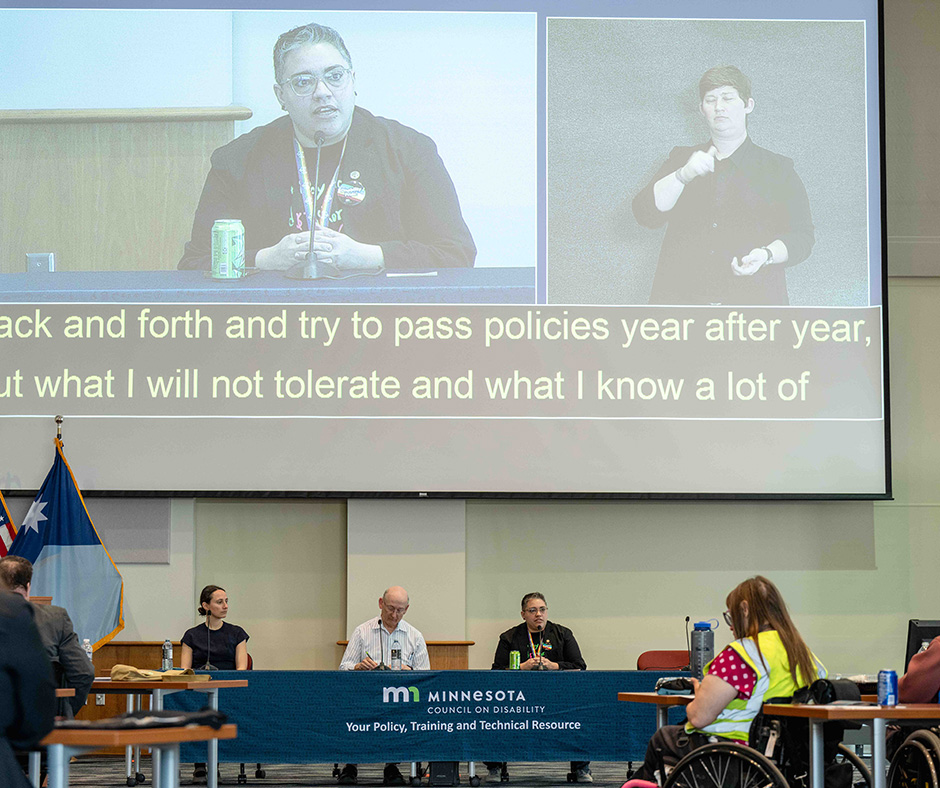
Independence Requires Investment
In March, the Minnesota Council on Disability’s annual Legislative Forum brought together advocates, legislators, and community members to tackle the barriers that keep Minnesotans with disabilities from living, working, and moving freely. The conversations converged on a single reality: true independence only happens when the state invests in the people and systems that make daily life possible. Two priority issues—direct-care workforce shortages and the lack of on-demand accessible transportation—show exactly why that investment matters.
Investing in the Workforce
The forum spotlighted the Damon Leivestad Direct Care Sustainability Act (Senate File 1127), named for the late advocate who spent decades fighting for better home-care support. The bill would raise wages for Personal Care Assistance (PCA) workers who provide ten or more hours of support, eliminate premiums for Medical Assistance for Employed Persons with Disabilities (MA-EPD), and remove asset limits for people 65 and older who previously used MA-EPD.
Representative Kim Hicks acknowledged that not every provision may pass this session but urged action: “Let’s try to move some of these pieces forward.” Representative Brion Curran added that career paths and fair pay are essential for retaining experienced supervisors.
Although several provisions have been folded into the preliminary Human Services omnibus bill, their fate in the final package remains uncertain. The discussion nonetheless underscored a shared commitment to Damon’s vision: making home care a respected, sustainable career so people with disabilities can live in the communities of their choice.
Investing in Accessible Transportation
Forum participants also heard how transportation gaps isolate people with disabilities—sometimes with life-or-death consequences. Sumukha Terakanambi, a power wheelchair user and policy consultant, recalled being stranded outside a barbershop on a bitterly cold day when his accessible vehicle broke down. Rideshare apps had no accessible cars, Metro Mobility required advance scheduling, and public transit was out of reach. “It’s not just about making sure people can go where they want for fun or for social activities, but there can be a real safety issue as well,” he said.
House File 1427, introduced by Representative Steve Elkins with a Senate companion from Senator Matt Carlson, would add a modest rideshare surcharge to fund a statewide fleet of wheelchair-accessible vehicles. Senator Scott Dibble expressed frustration at the bill’s slow progress: “I feel a lot of urgency around this … It’s frustrating we haven’t crossed the finish line yet.”
Key Takeaways
- Lived experience drove the agenda. Personal stories—from Damon’s decades of advocacy to Sumukha’s winter ordeal—kept the focus on real-world impact.
- Legislative interest is real. Support for both measures signal a recognition that these barriers hurt constituents statewide.
- Urgency is growing. Whether it’s unfilled PCA shifts or inaccessible rides, delays in action carry immediate consequences for safety, employment, and quality of life.
What You Can Do
- Track the omnibus bill. Follow committee updates to see which Damon Leivestad Act (Senate File 1127) provisions survive final negotiations.
- Watch House File 1427. If the transportation bill is rescheduled for a hearing, submit testimony or contact legislators to urge passage.
- Watch the forum for yourself. Watch the 2025 Legislative Forum playlist on YouTube. You can view the entire event or jump to a particular segment. NOTE: These videos took longer to post than we anticipated. Thank you for your patience as we worked through some production delays.
- Stay connected. Sign up for MCD mailings to stay informed and ready to act.
Investing in Independence
Independence requires investment. Investment in the workers who provide the support people need to live independently and in the transportation options that connect people to their communities. By funding these critical systems, we move closer to a barrier-free Minnesota where every person with a disability has full access to all aspects of life.